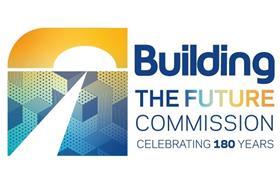The sad truth is that, as an industry, we focus too much on reactive solutions that can only catch people when they fall, says Seddon’s Nicola Hodkinson

The challenge of mental health is a widely recognised issue within our sector. Statistics from the charity Mates in Mind show that two construction workers die by suicide every day. Specifically, men in construction are three times more likely to die by suicide than the national average, while a third are living with elevated levels of anxiety each day.
Inconsistent working patterns, dangerous conditions and a challenging work-life balance all play a part in pushing our workforce to the edge, yet all remain commonplace in the day-to-day workload.

It is true that, even over the past decade, our industry has made strides in tackling the serious issue of poor mental health among our workforce. Conversations around wellbeing on construction sites have gone from being non-existent to a point where open conversations are now becoming commonplace.
Staff training in mental health first aid supports this, while regular toolbox talks, campaigns and initiatives are maintaining awareness of the topic. All these actions help to break down the stigma and create a safer environment to talk about mental health and thoughts of suicide.
The sad truth is that, as an industry, we are operating largely through reactive solutions, designed only to catch people when they fall. And, if the suicide figures tell us anything, it is that we can’t and don’t catch everyone.
Successful mitigation against mental illness can only come from a proactive effort to stop people from falling in the first place. This means challenging everything that we do, how we operate as an industry and protect the amazing people that work within it. Starting at the beginning is the best plan of action and, for our industry, this means starting with procurement and preconstruction.
Imagine a situation in which an experienced planner puts together a competitive programme of work to win a job – one that can be delivered safely with a quality installation. This programme may be 30 weeks with an average of 60 people totalling 72,000 hours.
The job is won at 26 weeks, but it will still take 72,000 hours to deliver. There is still a need to make up those remaining hours.
This introduces risk around the sequencing of work, critical path, managing interfaces and supply of resources, resulting in significant stress and fatigue to those working on site. That is, of course, still assuming everything goes right with procurement, design and external parties.
As long as procurement in construction continues to be transactional – with work won through a competitive process - contractors will continue to take risks in order to win
As long as procurement in construction continues to be transactional – with work won through a competitive process - contractors will continue to take risks in order to win. This leads to short programmes and preconstruction periods and restricted budgets, resulting in additional pressure on the site teams, ultimately compromising our people’s quality of life.
Combine this with a fragmented workforce (over 35% of which are self-employed) and complex supply chains impacted heavily by inflation. The direct implications of these conditions all too often materialise in staff being signed off sick or leaving the job altogether and, in the worst-case scenarios, can be the catalyst towards devastating fatalities. The challenge, therefore, is establishing how we procure without rewarding risk-taking behaviours.
Issues around “good procurement” are acknowledged through reviews such as Constructing the Gold Standard, which challenges framework leads to “comply or explain” why they are not following Construction Playbook guidance to improve outcomes for the client. However, it seems no one has joined the dots of how a more collaborative approach to procurement – through early contractor involvement, designing out risks, setting achievable and realistic outcomes and achieving a clear pipeline of work – has a direct impact on the mental health of our people.
The good news is that it does not have to go on this way. Ensuring a default level of trust between the client and the contractor from the outset is fundamental to establishing productive and beneficial relationships that can then be built upon through repeat work.
A shared understanding is required, one that recognises that the contractor intends to finish the job on time and to budget, in a way that is realistic and safe for its workforce.
I have seen first-hand examples of this level of trust yielding fantastic results for both parties. Projects procured through central government organisations are a shining example, as they are held to the Construction Playbook, which sets out a framework around early involvement.
This encourages the client to take on the contractor’s expertise from the outset, allowing us to set parameters that we know will deliver the project safely and successfully.
We know that the industry can be – and often is – a fantastic place to work but we cannot continue to turn a blind eye to these issues. A collaborative procurement process that provides early engagement, long-term programmes of work and “win-win contracting arrangements” lays the groundwork that sets the project up for success.
Collaborative procurement should be prioritised to deliver better project outcomes and long-lasting positive impacts on the wider industry, supporting the mental wellbeing of our workforce.
But we have to set this standard collectively. Sadly, there will always be someone who will step into a compromising job to deliver it. However, that is only made possible by the clients that allow them through the door.
When we are losing two workers a day to suicide, with hundreds more signed off sick, it is not just the industry’s loss. It is a loss belonging to that person’s family, their friends and their wider communities that we all share. The health and wellbeing of our workforce must be held as a non-negotiable by all.
Nicola Hodkinson is owner and director at Seddon. This year’s Mental Health Awareness Week is from 15 to 21 May
Building the Future Commission

The Building the Future Commission is a year-long project, launched to mark Building’s 180th anniversary, to assess potential solutions and radical new ways of thinking to improve the built environment.
The project is looking at proposals for change in eight areas, including workplace, culture and leadership, as well as:
- Education and skills
- Housing and planning
- Energy and net zero
- Infrastructure
- Building safety
- Project delivery and digital
- Creating communities
>> Editor’s view: And now for something completely positive - our Building the Future Commission
>> Click here for more about the project and the commissioners
Building the Future is also undertaking a countrywide tour of roundtable discussions with experts around the regions as part of a consultation programme in partnership with the regional arms of industry body Constructing Excellence. There is also a young person’s advisory panel.
We are inviting readers to submit ideas for how to improve the built environment through our online form which will form part of our Ideas Hub coming soon.


























No comments yet